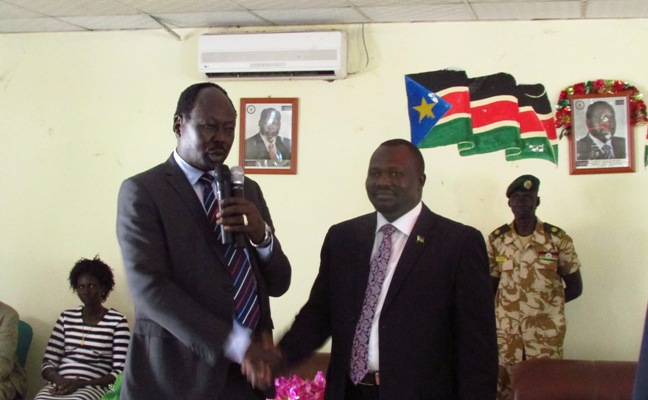Jonglei state governor questions unfair distribution of new counties

September 24, 2016 (BOR) – Governor Philip Aguer has questioned the unfair distribution of the current newly created 14 counties in the new Jonglei state, but supported the increase in the number of the counties in principle although merging some of them in the future, he said, is a possibility.
Aguer, who first rejected the creation of the 14 counties earlier this month, said he had received a valid reason from the national capital, Juba, for their implementation. He made the remarks during the swearing in ceremony of the newly appointed commissioners on Friday, 23 September.
“The local government board recommended the 14 counties, so we have the legitimacy to implement the fourteen counties,” Aguer noted in his speech.
According to Aguer who comes from Twic East county, home to late leader John Garang, he said the biggest question which remained not answered was the reasons for not increasing the number of counties in Duk and Twic East counties.
Currently, the former Bor county, where defense minister Kuol Manyang Juuk and information minister, Michael Makuei Lueth, has been increased into 8 new counties while Twic East is only increased to 3 counties and Duk with only 3 counties as well, making the total 14 new counties.
“The other question was, what about the other counties, like Twic East and Duk, who did not get more [counties] than what they requested? We have addressed that by seeing it to the population,” Aguer inquired.
“Decentralization process is not a one-day-process, you do this step and you evaluate it. So the rest of the areas-Twic and Duk- in the near future, if they need more counties, provided that is justified, and is not bringing more problems, then definitely we will recommend a county,” he said.
He said after two to three years, the state may evaluate the status of the new counties and may decide to further increase the number or merge the current ones into smaller number of administrative units.
“As I said decentralization is a process, [that] needs to be evaluate, may be 2 to 3 years, evaluation will come, and we will recommend more [counties] or amalgamation,” he added.
He said services delivery to the people should be the top priority to the government, not to have more counties.
“We the politicians need more counties, but what do the people want? The people need more services; it is our role to provide the services. You have more counties now, what is remaining is the services and the people will start questioning you tomorrow, where are the services?” Aguer, a former SPLA military spokesperson, continued.
Although the governor instructed the minister of finance to plan on how to get the budget for the 14 counties, he clearly urged the commissioners to think of where to get their vehicles as the state would not be able financially to buy vehicles.
“Now that you are appointed, expect a lot of challenges. You may wonder if you will get salaries. Mobility is another, bicycle and footing will be shame on the commissioner. For you to get vehicles, you must mobilize 250 heads [each] of cattle to buy a car,” he said, directing them to get the cattle from the populations they will be administering in their respective counties.
“We have every reason to create more counties because we have issues of insecurity. Issues of the education are handled at the level of the payams and counties,” he further continued.
Peace was among the issues the governor talked about when he addressed the new commissioner, saying peace between the Dinka of Jonglei state and the Murle ethnic group of Boma state should be consolidated.
“We have the task to implement the peace agreement signed in Juba and the peace between us and our neighbors. We have moved two steps forward in the direction of peace between us and Boma state. The Murle community is more than committed to peace and to peaceful co-existence,” he emphasized.
He said through achievement of peace the state authorities should plan for the return of the displaced people who are scattered all over the region, adding they will not come back if the authorities do not have peace and security.
“Through peace, we will return our cattle camps that are becoming bone of contention in Equartoria,” he said.
Some commissioners, who spoke on behave of their colleagues, pledged to work with the government to improve service delivery, work for peace within, and between their borders.
(ST)
